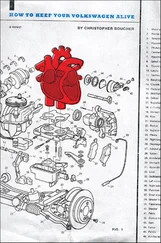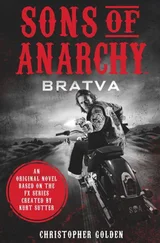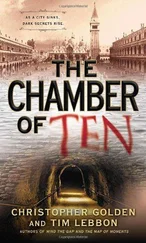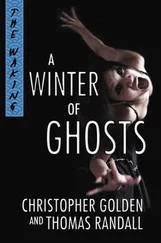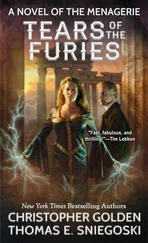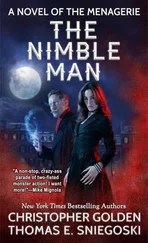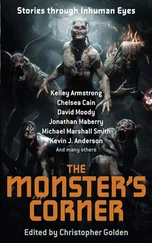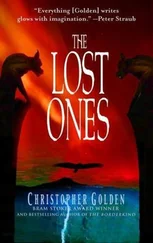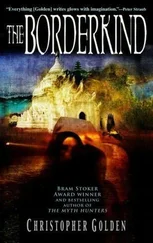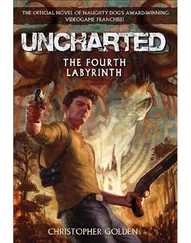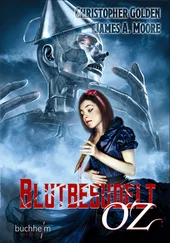“No — of course not. The book will end.”
The Reader crossed her arms. “And I can leave.”
“Sure.”
“And I can come back here?”
“Of course,” my Mom said. “When you’re finished reading Appleseed , you can read anything you want.”
“Even if I do go with you, there’s nothing I can do to help.”
“Just try,” said the Mother.
“Shit,” said the Reader. She looked around — at the festival behind her, and then at the slow traffic on Main Street. “If I’m going, I have to make a pitstop first.”
“Absolutely not,” the Mother said. “There’s no time for that.”
“Forget it, then — find yourself another reader,” said the Reader.
The mother threw her hands. “Every second that passes—”
“Trust me, OK?” the Reader said. “It’s important.”
“Even with my son in the ground?”
“Yes,” said the Reader. “Yes.”
Diane stepped forward and put her arm around the Reader. “Grab on to my waist.”
The Reader wrapped her arms around Diane.
“Hold on tight,” Diane said. Then she pushed with her feet and lifted the Reader off the page. They rose over Northampton; the Reader hooted as she saw the words get smaller beneath her. When they reached skimming height, Diane shouted “Where’m I going?”
The Reader pointed toward Route Nine. “Over the bridge and into Amherst.”
“East?”
The Reader nodded. “We’re looking for a place called Atkin’s.”
They flew over green rolling hadleypages of farms and houses and then into stories of Amherst: pages covered with cows, silos, and wide-open spaces. The Reader pointed to the corner up ahead. “There it is,” she hollered. Diane saw a large farmstand, a half-filled parking lot, and rolling pages of green to the right. When she looked past the farmstand, she understood: the adjacent fields were covered with trees— apple trees, their branches shouting in green and red. The grove stretched back to the edge of the page, spilled off it, and continued on.
Diane dropped into the grove and set the Reader down onto the page. “Didn’t I tell you?” the Reader said.
Diane spit. “Get what you need and let’s go.”
The Reader approached a tree, grabbed an apple, and pulled it off the branch. “These are apple trees ,” she said.
“I know they are,” Diane said.
“And it’s pick-your-own!” the Reader said. She took a bite of the apple and then held it out to Diane. “Don’t you want one?”
“Not right now I don’t,” said Diane. She took the bitten-into apple and put it in a drawer in her skirt. “  needs us. Now point me to the closest bookwormhole.”
needs us. Now point me to the closest bookwormhole.”
The Reader nodded toward Route 116. “Belchertown — a few miles that way,” she said.
Diane lifted them up. High over the page, the Reader looked down and shouted, “You have to admit — that grove is a beautiful sight, isn’t it?”
But Diane didn’t answer her; she tightened her grip on the Reader and skimmed forward, faster and faster, as fast as any Mother ever had.
The Reader and the Mother volted through the bookwormhole. As they did, light flooded the town, painting the buildings and the fields, swarming the Amphitheatre and the hospital and drenching Appleseed Mountain.
Diane didn’t stop; she carried the Reader high up over the buildings and trees and then banked left and bulleted forward. “Welcome home!” Diane shouted.
The Reader tried to get her bearings. Were they on Guerry Street? No — that was Jonquil, just past the Green, not far from Colton’s deadgroves.
Something was happening on the ground below. Up and down the street, people were stepping out of their houses. Fifty feet away to their right, a woman wearing a bathrobe stood in the middle of the road, stretching out her arms. When she looked up at you, you saw that she had a hole in her face. “Halleluiah!” she shouted at you.
“Thanks be to the Core!” shouted someone down the road.
“Mothers did it! They did it!”
The bookwormholes, you saw now, were everywhere: in the people, in the trees, punching through the lawns and roads every ten or twenty feet. “What happened here?” you shouted.
“You did,” Diane said.
“What do you mean?”
Not a street or page, it seemed, had been spared. Whole houses were burned to the page; some streets were completely gone. The center of town was leveled. Zooming over the high school, you could see the Small Pear up ahead — all of the windows had been smashed; Gilbert’s was covered with plywood; so was the Beagle. You looked to your right. “Look at the Hu Ke Lau !” you hollered. It was just a charred corpse of a restaurant. And many of the pages on the North Side were nearly empty — burned out, and rotted completely through in some places.
“Where are the Mothers ?” you shouted.
“Most of them were KIA, some of them maybe captured,” Diane shouted. “The rest are in hiding.”
The mood on the street below, though, was jubilant: people were clapping or hooting, shaking hands, high-fiving, and hugging. Passing over Coventry, a long-haired man shouted up at them. “Beautiful!” He took off his shirt and slammed it to the page. “It’s fucking beautiful!”
Diane turned onto Converse Street. Soon you could see the edge of the worryfields. Even there, though, people were happy: you saw two worriers dancing, another just lying on her back and staring up at the bright sky.
As you approached the fields, you saw a big lump in the far corner of the page. “What’s that?” one of your thoughts said, pointing. Something was moving next to the lump. Was it a machine? No, it was a man in a gray jumpsuit, hunched over the page. He was digging. “Is that Ralph?” you shouted. But you knew it was.
Diane dipped, grazed the surface, and lowered you onto the white soil. Ralph didn’t even look up. Dirt flew over his shoulder.
“Ralph,” Diane lyled.
You were in awe — you’d never seen anyone work so hard. Ralph didn’t even have a shovel — he was scooping the pagesoil with his bare hands.
“Ralph!” Diane shouted again.
Ralph looked up, surprised. “Wha,” he said.
“I need you to stop digging—”
He shook his head. “The page is tough,” he said, “but I’m making progress—”
“I need you to stop that right now and go find someone for me.”
Ralph’s straightened up. “Who?” he said.
The Reader watched Ralph’s truck drive off; then she turned to Diane. “Walk around the page,” the Reader told her. “Start collecting words.”
“What for?”
“As many as you can find.”
“They’re all dead,” said Diane.
“That’s OK,” the Reader said.
Diane went to work on this page and the next, gathering as many words as she could. When her arms were full, she stacked the words next to her son’s grave. Soon, she saw Ralph’s truck drive into the worryfields — he hadn’t been gone long. The passenger’s-side door opened and the Memory of Johnny Appleseed stepped out.
“Oh my Core!” shouted the Memory, hobbling toward you. He held out his ethereal arms. “You came back !”
“Took some convincing,” Diane said.
“Did you hear what happened to  ?” the Memory of Johnny Appleseed asked her.
?” the Memory of Johnny Appleseed asked her.
“Of course she heard,” Diane said.
“I brought something for you,” the Reader told the Memory. She gestured to Diane, who opened the drawer in her skirt.
Читать дальше
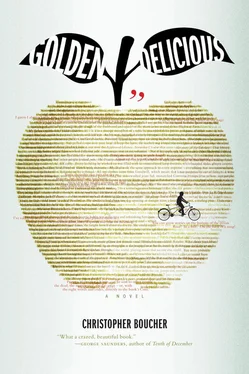
 needs us. Now point me to the closest bookwormhole.”
needs us. Now point me to the closest bookwormhole.”
